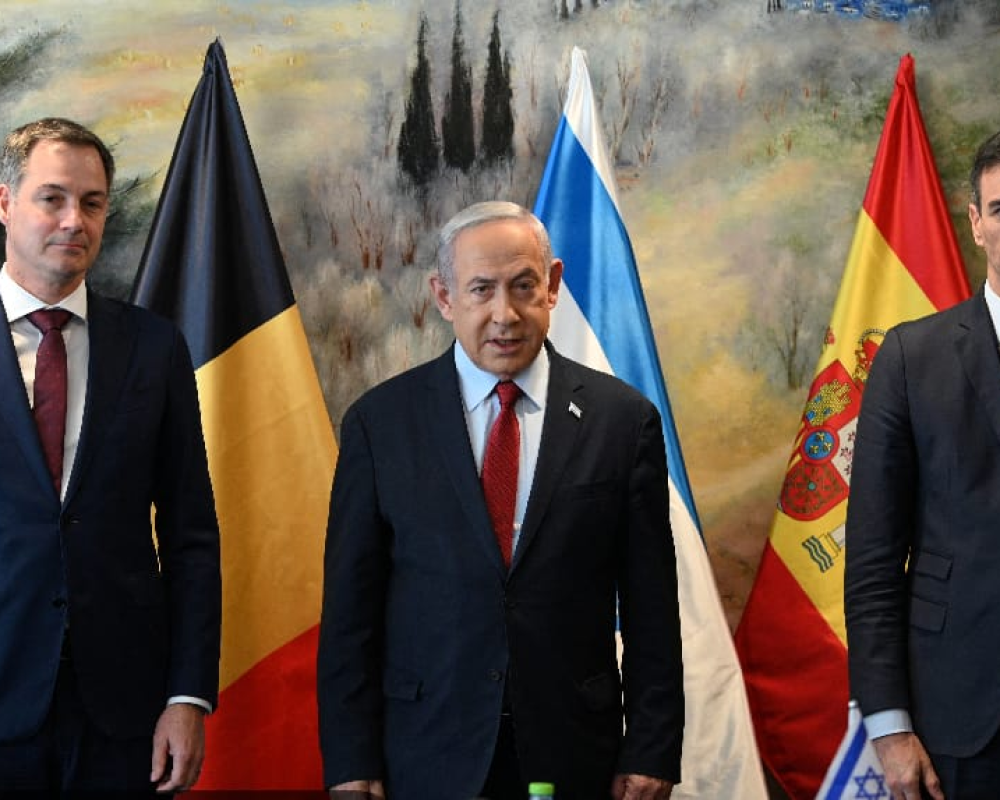
Bethlehem/ PNN /
A diplomatic row has erupted between Spain and Israel following Spanish Prime Minister Pedro Sanchez’s recent visit to Israel and the Occupied Territories. During a meeting with Israeli Prime Minister Netanyahu and President Herzog, Sanchez was highly critical of Israeli policy and their ongoing savagery in Palestine.
Whilst also condemning Hamas’ actions on October 7th, Sanchez described the 'indiscriminate' Israeli slaughter of men, women, and children in Gaza as ‘truly unbearable.’ ‘Let me also be clear,’ Sanchez asserted, ‘Israel has to abide by international law, including international humanitarian law.’
Describing the situation in Gaza as a ‘humanitarian catastrophe’, Sanchez pointed out that Israel’s brutality has been met with revulsion and disgust around the world. ‘The whole world is shocked at the images we see coming from Gaza every day,’ the prime minister said, adding that those engaged in military action had a responsibility to ensure that civilians were protected. Sanchez also appealed for the immediate establishment of genuine humanitarian corridors to prevent an even greater loss of life through starvation and famine.
Calling for an international peace conference to address the conflict, Sanchez, however, made it clear as to what he viewed as the solution. ‘Today, peace means the establishment of a viable Palestinian state that includes the West Bank, Gaza and East Jerusalem, according to UN resolutions,’ the Spanish Prime Minister insisted.
On the next day, Sanchez spoke at a press conference on the Egyptian side of the Rafah Crossing alongside Belgian Prime Minister Alexander de Croo, where both men continued to criticise Israel’s indiscriminate and murderous onslaught on Gaza.
And once more, the Spanish prime minister reiterated the importance of a Palestinian state. But this time, he went further. Declaring the importance for all European Union states to unite and recognise the state of Palestine, Sanchez said that if this wasn’t possible, Spain would be willing to do so unilaterally.
The latter is consistent with Sanchez’s recent declarations in the newly elected Spanish parliament, where he announced that his ‘first commitment’ for the Spanish legislature would be ‘to work in Europe, and of course in Spain, to recognise the Palestinian state.
The Israeli reply to the pair’s comments at Rafah was swift and highly critical. Israeli foreign minister Eli Cohen hit out at what he called the ‘false claims of the Prime Ministers of Spain and Belgium who give support to terrorism.’ The Spanish and Belgian ambassadors to Israel were also summoned by Cohen for ‘a harsh rebuke’.
In response, the Spanish Foreign Minister, Jose Manuel Albares, condemned the Israeli accusations, describing them as ‘false’, ‘especially serious’, and ‘unacceptable’.
Meanwhile, Hamas released a statement praising Sanchez and de Croo for their ‘clear and bold stance.’ Pointing to Sanchez’s condemnation of the ‘indiscriminate killings’ by the occupying regime, the statement also referred to the fact that Spain ‘may unilaterally recognise the Palestinian state if the European union did not take such a step.’
The escalation in rhetoric reflects the tension between the Spanish and Israeli governments that has heightened in recent weeks after comments by Spanish legislators. Ione Belarra, who until recently was Minister of Social Rights in Sanchez’s government, slammed the Israeli regime for acting with ‘total impunity’. Belarra also called for the severing of diplomatic ties with Israel, accused the occupying Israeli regime of an ‘attempted genocide’, and demanded that Benjamin Netanyahu be tried before the International Criminal Court at the Hague for war crimes.
Irene Montero, who recently vacated the role of Minister of Equality, also condemned the occupation regime in Tel Aviv, and emphasised the importance of refusing to be complicit in a ‘planned genocide that the State of Israel is committing.’
And Marta Lois, the spokesperson for Sanchez’s governing coalition allies Sumar, has called for a ceasefire, for the imposition of economic sanctions on Israel, and for the recognition of the Palestine state, the latter which she emphasised ‘must be done now.’
Meanwhile, in Barcelona, the municipal government agreed to ‘interrupt’ institutional relations with the Government of Israel, suspending relations until there is a definitive ceasefire, respect for the basic rights of the Palestinian people, and a guarantee of compliance with United Nations resolutions.
It has become increasingly evident that governments across Europe are beginning to respond to the pressure they are feeling from below, as demonstrators have taken to the streets to express their outrage at the barbarism and savagery of the Tel Aviv occupation regime. Responding to the latest actions of Pedro Sanchez, Ione Belarra has pointed out that social and political pressure has been effective and has argued that the public must continue fighting ‘with all our might, for an end to the genocide and demanding concrete measures.’
As millions around the world have taken to the streets again this weekend to show their support for the Palestinian people and to express their opposition to the ongoing genocide, the importance of Belarra’s words must not be forgotten.
And it is for this reason that people must continue to make their voices heard, in every town, in every city, in every country, until there is peace and justice in Palestine.